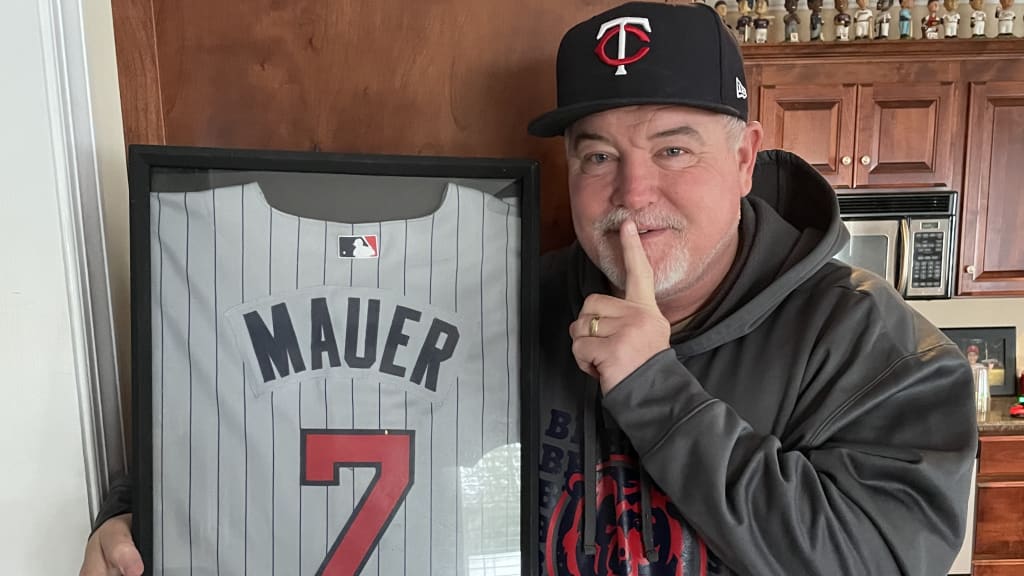
This story was excerpted from Do-Hyoung Park’s Twins Beat newsletter. To read the full newsletter, click here. And subscribe to get it regularly in your inbox.
Through all these years, Matt LeCroy has done his best to maintain plausible deniability -- so apologies are due for this reveal that one of Joe Mauer’s first game-worn jerseys from the Major Leagues resides not in a display case somewhere at Target Field, but in a frame on a wall in LeCroy’s guest house in South Carolina.
“To this day, that's one of my most special jerseys, you know, with it being game-used,” said LeCroy, who caught alongside Mauer in the Majors for parts of three seasons. “It was one of his first ones. And you know, hopefully the Twins don't call me and ask for it.”
For LeCroy’s sake, let’s hope the club’s statute of limitations has lapsed on collecting memorabilia, because that jersey is now a big part of baseball history. After Tuesday’s announcement of the election results for the National Baseball Hall of Fame, it turns out that Twins jersey now represents the start of a first-ballot Hall of Fame career.
When Mauer is inducted into Cooperstown on July 21, the Twins legend will become only the third catcher to make it into the Hall in his first year of eligibility, joining Johnny Bench and Iván Rodríguez. And from the start, Mauer’s fellow catchers in the early days of his career were aware that they were witnessing something special.
Just ask Bryan Kennedy, the catcher who was drafted out of Long Beach State 23 rounds after Mauer in that 2001 MLB Draft and backed up the future Hall of Famer in the Minors.
Twenty-three years later, of course Kennedy still remembers when Mauer arrived in little Elizabethton, Tenn., after that Draft, at the Twins’ longtime Rookie-level affiliate in the Appalachian League. There was a “wow” factor, for sure -- everyone had heard about the three-sport star who had passed up a scholarship to play quarterback for Florida State under Bobby Bowden.
Then, they all saw it.
“I was just amazed by his ability to receive the ball,” says Kennedy, now Athletic Coordinator and head baseball coach for the Western Christian Schools in Southern California. “The biggest thing to me was how he threw the ball behind the plate. I didn't even like to take infield/outfield [drills] with him because his arm was so much better than mine. I hated throwing behind him.”
Mauer went down to his first big league Spring Training at age 18 before the 2002 regular season, where he shared the Fort Myers clubhouse with LeCroy for the first time.
The first order of business for LeCroy -- now the manager of Washington’s Triple-A affiliate in Rochester -- was to give Mauer some good old-fashioned ribbing, Atlantic Coast Conference-style, because LeCroy is a proud Clemson Tiger (and still a season ticket holder) and Mauer, of course, had committed to their rivals in Tallahassee.
The second order of business was to start planting the seed for Mauer to get him one of those first big league jerseys, because from watching Mauer tear up that first Spring Training while barely old enough to sign his own legal documents, LeCroy immediately knew that his MLB career was going to be special.
“I just remember his first at-bat,” LeCroy said. “I believe he walked, if I'm not mistaken. And just watching him, he didn't panic. He wasn't over-aggressive. I mean, it was just, I'm sitting here going, ‘Man, I can't imagine being here at [18] years old, competing at this level.’ And with how easy it was. You just knew.”
(It’s difficult to fact-check anecdotes from Spring Training 2002, but given this is Mauer and a story about an impressive walk, it passes the sniff test.)
Whether that was a walk, or a single up the middle, or a double roped on a line to left-center, it would have been quite apt for the big league career that started in 2004, a year before veteran Mike Redmond arrived to serve as Mauer’s backup and mentor for five seasons, spanning the astonishing peak of Mauer’s career.
Redmond says his favorite moments of all were when they were technically meant to be shagging batting practice balls in the infield but would, instead, just stand and talk through that day’s lineup, the hitters’ tendencies, and their plan of attack.
Mauer progressed as a player plenty through that remarkable 2009 MVP season, but Redmond’s greatest point of pride was in watching Mauer grow as a leader in the clubhouse and of the pitching staff, which took time -- even for the wonder kid for whom the physical game always came so easily.
“Sometimes, as a young player, that growth takes a little bit of time,” said Redmond, now the bench coach of the Colorado Rockies. “The step that I saw was just the leadership. Him taking the reins and, when you had to have a tough conversation, you had a tough conversation, whether you liked it or not and whether you wanted to do it or not, because you knew that the team was relying on that.”
These guys always knew what was in store for Mauer if he were to stay healthy -- and even though his body didn’t allow for him to catch his entire career, he still made an indelible mark as one of the greatest to ever strap on the catcher’s gear.
Now, the Hall of Fame electorate has said as much, too -- and resoundingly.
“It'll be really cool just because … I probably didn't help him at all, but just, I just remember when the coaches came to me and were like, ‘Hey, can you help Joe with pitch calling?’” Kennedy said. “Not that I helped him at all, but just for me, and being drafted in the same year as him, it was kind of a cool [thing].
“I tell people all the time that I was Joe Mauer’s backup. … It’ll feel like a proud moment [when he goes in]. Not that I had anything to do with it, but just that I got to see a little bit of this.”
